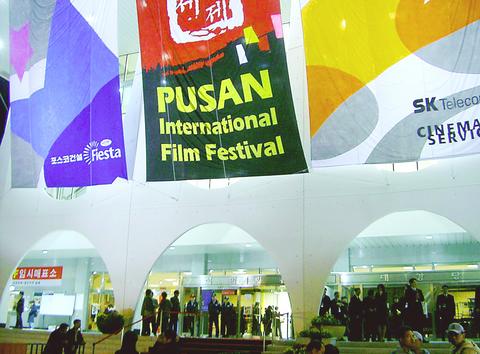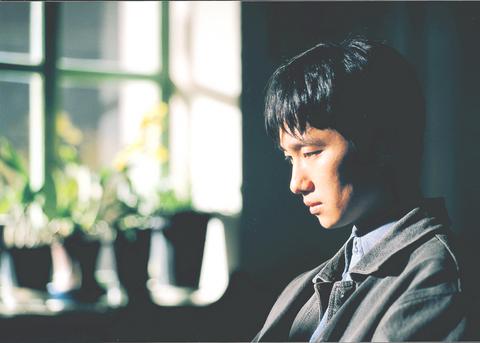With a simple red-carpet ceremony and the screening of the film Dolls by Japanese director Takeshi Kitano at Busan Citizen Hall on Saturday night, the competition section of the 7th Pusan (Busan) International Film Festival (PIFF) was brought to a close.
The main award, under the heading of New Currents, went to the Korean film Jealousy is My Middle Name by Park Chan-ok and the Indian film The Rite ... Passion by K.N.T. Sastry. The FIPRESCI Award, a prize awarded by the Association of International Film Press, went to another Korean film, Too Young to Die by Park Jin-pyo.

PHOTO: YU SEN-LUN, TAIPEI TIMES
Taiwan's two entries in the competition, Alex Young's (

PHOTO COURTESY OF THE PUSAN INTERNATIONAL FILM FESTIVAL
The awards are only a small part of a 10-day event. As a whole, PIFF 2002 was another step in Korea's ambition to become a center for Asian cinema, with the festival as its most important event. This year, whether at the parties held by the host Korean film companies or at PIFF events, the atmosphere was passionate, fresh and energetic. The passion could also be felt in the cinemas, which were packed with young Koreans, many eager to get autographs from visiting directors.
In total, the 226 films screened over 10-days attracted an audience of more than 160,000. The event also attracted 5,338 guests, with the proportion of international guests at an all time high: 290 guests from movie industries worldwide joined PPP (Pusan Promotion Plan) and 125 international journalists covered the event. No wonder Kim Dong-ho, the festival's director said proudly at the closing ceremony "We're becoming one of the most important film festivals in Asia, with programmers from three of the world's biggest film festivals (Cannes, Berlin and Venice) coming here to join us."
Promoting new Asian film projects and recognizing new Asian talent was a clear motif of PIFF 2002. This has proved a smart move, and has achieved much more for the festival than making it just another showcase of international films in Asia.
PIFF's two Asian programs, New Currents -- Asian films by first or second time directors -- and A Window on Asian Cinema, have brought together a representative list of Asian films.
Park Jin-pyo's Too Young to Die was the biggest winner this year, taking both the FIPRESCI Award and gaining a Special Mention in New Currents.
Too Young to Die is a film depicting the love and sexual life of an aging couple. It is particularly remarkable for its innovative camera work. Too Young to Die is a very simple story about two old people who meet and have sex. With two elderly non-professional actors who are a couple in real life, the film shows raw and powerful images of their actual lovemaking.
The FIPRESCI jury concluded that the film presented "an authentic and endearing vision of physical and romantic love at an advanced age."
The Rite ... Passion by K.N.T. Sastry, winner of the New Currents Award, tells a story of a man facing a dilemma between his own traditional values as a priest and the fact that his son is a social revolutionary.
Sastry, winner of the Gandhi Award for Best First Picture, takes a cool look at an India caught at the confusing crossroads between tradition and modernity.
The top New Current Award winner, Jealousy is My Middle Name, came as something of a surprise. Park Chan-ok, who was assistant director of Virgin Stripped Bare by Her Bachelor directed by Hong San-soo, shows a subtle sensibility. It tells the story of a weak-willed college boy who, after being abandoned by his girlfriend, goes to work for the man who stole her from him. The man, a middle-aged chief editor of a publishing company, becomes his mentor, and he subsequently falls in love with another of this man's many mistresses. Park is very precise in portraying subtle relationships between the two men and the women they are involved with, but at the end, the plot tends to unravel.
Despite this surprise, PIFF's strong Asian showcase attracted attention from film professionals and international press. Out of the 33 films selected, 11 films are Asian premieres and five are world premieres, an indication that more and more Asian films are choosing Busan as the first stop in their search for international markets or distributors. "PIFF has become the center for showcasing Asian films," said festival host Kim.
He is not alone in believing this. Taiwanese film critics such as Jane Yu (
"PIFF may have taken over the role of the Hong Kong Film Festival in terms of showing Asian films, because PPP serves the important function of drawing distributors from the US or Europe who want to check out new products from Asia," said Yu, organizer of Taiwan's Women Make Waves film festival.
It takes more than energy and passion to organize an international film festival such as PIFF. It also needs money and effective allocation of facilities and manpower. PIFF has a budget of around US$6 million, seven times that of Taiwan's Golden Horse Film Festival.
The PIFF Square in Nam-po Dong has two big cinemas with nearly 1,000 seats between them. It is located at the center of Busan's old shopping district and fish market, an area rather like Taipei's Hsimenting. A warm welcome was provided by a host of volunteers. PIFF mobilized around 300 volunteers from local colleges to work in ticketing, reception and press and transportation coordination.
Facilities for the press where also impressive, with the festival's press center providing wireless Internet connection -- a great opportunity for Korea to show off its hi-tech development as well.
The only fly in the ointment is the fact that English is not widely used and this led to occasional communication errors. There was also criticism of the one-hour trip between Nam-po Dong and the Haeundae beach community, another PIFF location. Next year all festival events will move to Haeundae.

April 28 to May 4 During the Japanese colonial era, a city’s “first” high school typically served Japanese students, while Taiwanese attended the “second” high school. Only in Taichung was this reversed. That’s because when Taichung First High School opened its doors on May 1, 1915 to serve Taiwanese students who were previously barred from secondary education, it was the only high school in town. Former principal Hideo Azukisawa threatened to quit when the government in 1922 attempted to transfer the “first” designation to a new local high school for Japanese students, leading to this unusual situation. Prior to the Taichung First

Chinese Nationalist Party (KMT) Chairman Eric Chu (朱立倫) hatched a bold plan to charge forward and seize the initiative when he held a protest in front of the Taipei City Prosecutors’ Office. Though risky, because illegal, its success would help tackle at least six problems facing both himself and the KMT. What he did not see coming was Taipei Mayor Chiang Wan-an (將萬安) tripping him up out of the gate. In spite of Chu being the most consequential and successful KMT chairman since the early 2010s — arguably saving the party from financial ruin and restoring its electoral viability —

The Ministry of Education last month proposed a nationwide ban on mobile devices in schools, aiming to curb concerns over student phone addiction. Under the revised regulation, which will take effect in August, teachers and schools will be required to collect mobile devices — including phones, laptops and wearables devices — for safekeeping during school hours, unless they are being used for educational purposes. For Chang Fong-ching (張鳳琴), the ban will have a positive impact. “It’s a good move,” says the professor in the department of

Article 2 of the Additional Articles of the Constitution of the Republic of China (中華民國憲法增修條文) stipulates that upon a vote of no confidence in the premier, the president can dissolve the legislature within 10 days. If the legislature is dissolved, a new legislative election must be held within 60 days, and the legislators’ terms will then be reckoned from that election. Two weeks ago Taipei Mayor Chiang Wan-an (蔣萬安) of the Chinese Nationalist Party (KMT) proposed that the legislature hold a vote of no confidence in the premier and dare the president to dissolve the legislature. The legislature is currently controlled